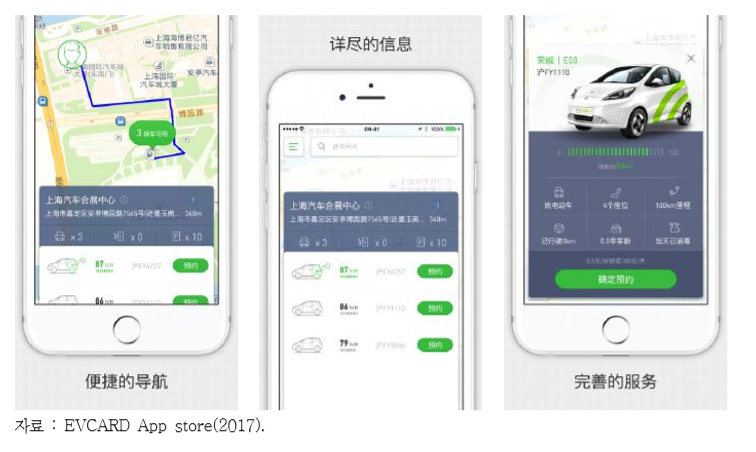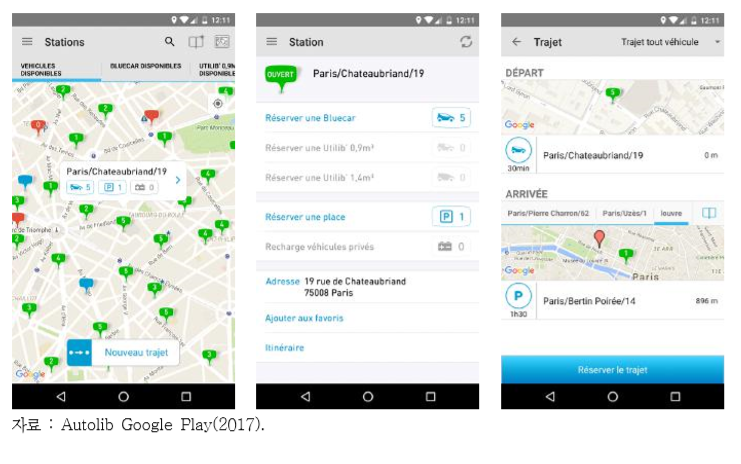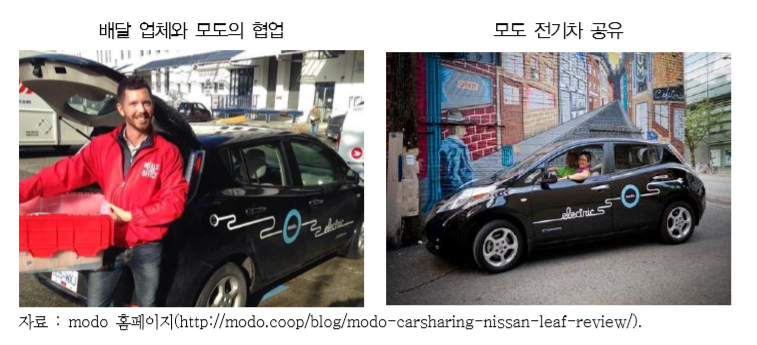List
Story > NEWS > Detail
[News] Overseas Electric Vehicle Shared Economy Platform
Learn about the shared economy platform related to electric vehicles abroad. Electric cars don't just mean cars are electric cars, they mean 'green'. Wouldn't it be an electric car sharing economy that maximizes elements of "green" for the purpose of "efficient allocation of resources," which is the original purpose of a shared economy? Let's take a look at electric car sharing businesses in many countries around the world and find out their characteristics.
First of all, there is Car2go, Germany. Car2go, a subsidiary of Daimler AG, is a car-sharing platform that started in Germany in 2008 and is headquartered in Stuttgart, Germany. Car2go is mostly a smart portu, and it is only for Mercedes-Benz vehicles. As of October 2016, 25 cities in eight countries shared about 14,000 vehicles, including electric cars, with 2 million members. The areas that share electric cars in Kathugo are Stuttgart, Germany, and Madrid, Spain, starting with Amsterdam, the Netherlands, in November 2011. It started sharing electric cars in San Diego, California in the following year, but withdrew after five years due to a lack of charging facilities for electric vehicles. The San Diego area initially expected to install 1,000 charging facilities, but only 400 charging facilities were installed in early 2016, with an average of 20 percent of electric vehicle-sharing vehicles not available due to lack of charging facilities.

The method of using Car2go can be used after registering personal information such as driver's license and payment information on the website, and installing the Car2go mobile app after approval is obtained. The Katugo app can check the location and status of vehicles around the house in real time and make reservations. Service charges vary by region by minute and hour and include parking, insurance, charging and service costs. If you drive more than the basic distance, an additional charge will be charged per kilometer. Amsterdam and Madrid's Cattugo serve only two-seater Fortu electric vehicles, while Stuttgart also shares gasoline vehicles in addition to electric vehicles. CATUS users can reduce the cost of parking in public parks or designated areas without parking fees.
It is followed by China's EVCARD. China's Shanghai Automotive Industry Corp.'s EVCARD is an electric car sharing platform that first began in China in 2013, offering electric vehicle sharing services in 23 cities. It currently operates 8,500 electric vehicles and 2,800 chargers nationwide, and shares 5,000 electric vehicles in Shanghai alone. It has also established itself as a high-speed transportation hub, securing more than 100 parking spaces at the Chengdu Shunryu International Airport Terminal. The number of EVCARD members stood at about 330,000 as of 2016, receiving 300,000 orders each month, and plans to distribute more than 70,000 electric vehicles to members of 50 Chinese cities this year.

EVCARD can be used after receiving a card through the process of personal information registration and approval on the website. Registered users can check the amount of electric vehicles and residual charging that are available around them through their smartphone EVCARD app, and can make reservations and payments in real time. The rental fee is 15 yuan (2,451 won) for 30 minutes, and the deposit is 1,000 yuan (164,820 won). If the time is exceeded, it will cost 0.5 yuan (82 won) per minute and limit it to a maximum of 180 yuan (29,407 won) per day). EVCARD also provides a series of vehicle operation services for all electric vehicles, including rescue services, car insurance, maintenance and operational data collection, repair, and installation and management of charging facilities.
Let's go to France next. The company's name is Autolib. Bolore started the Autolib electric vehicle sharing platform service in Paris in December 2011, which brought the structure of the bike-sharing system "Believe." Electric cars share Volore's Blue Car, and are building parking lots and charging station systems across the city. As of July 2016, there were 3,980 electric vehicles in Autoliv, with 126,900 registered users. In addition, Autoliv has 1,084 unmanned rental stations (charging stations) in downtown Paris, including 5,935 chargers. Besides Paris region, Autoliv has expanded its businesses to share electric vehicles with BlueLy and BlueCab respectively in Lyon (2013) and Board (2014).

To use Autoliv's electric vehicle, register your personal information online, select the available membership, and reserve your vehicle. Afterwards, vehicles can be used at unmanned rental stations by receiving real-life cards (badges). When returning, check the real-time parking area on the mobile or website and return it. Service charges are divided into basic and premium. The basic user can pay €9.5 and use 30 minutes, with an additional charge of €0.32 per minute. Premium members must pay the annual membership fee of €10 and use it for 30 minutes without the basic fee and pay €0.23 per minute as an additional charge. Autoliv's charging system is open to electric vehicle and electric motorcycle owners in addition to its registered members. Charging customers must also be registered, and only in the first year can they be recharged at a designated location after paying the registration fee of €15. It is €1 per hour and is only available twice a day.
Then, let's look at the modo of Canada, a North American country. Modo, headquartered in Vancouver, Canada, was founded in 1997 as the first car-sharing cooperative in North America to share cars. Modo is meeting the needs of its members and communities, reducing traffic congestion and pollutants, and reducing the land area for parking, while reducing reliance on private vehicles.

As of 2016, there are 17,000 members, 700 operators, 100 people including real estate developers and local governments are using Modo, with 500 vehicles. Electric cars were first introduced in October 2011, and each of the five share hybrid cars and electric cars in one unit. Modo is available after signing up online or mobile apps for membership and mailing fobs such as smart keys or visiting Modo offices. On the mobile app, you can check close vehicles in the surrounding area and set and reserve time for at least 30 minutes and up to 30 days after selecting the vehicle. Modo membership is divided into individuals and operators, and individual members are divided into two categories: Modo plus Monthly. Modo Plus members subscribe for a future refund of $500 and an annual maintenance fee of $1 and are available at $5 per hour (up to $50 per day) and 20¢ per kilometer. Monthly members register for membership fee of $10 and $8 per month, and are available at $8 per hour (maximum of $64 per day). The price includes 200 kilometers per booking, and if you drive more than that, it will cost 20 pounds per kilometer. The modus operandi includes the costs of fuel, insurance, parking, emergency departure services, car wash, maintenance and repair.
We looked at electric vehicle sharing platforms from around the world. South Korea's Hyundai Motor Co. saw an article that it exported electric cars to Singapore's shared car platform, Grab. If there is active supply of electric vehicle charging stations and shared electric vehicles in Korea, we hope that sharing platforms for electric vehicles and sharing platforms for electric vehicles will be formed in Korea in the future.
Learn about the shared economy platform related to electric vehicles abroad. Electric cars don't just mean cars are electric cars, they mean 'green'. Wouldn't it be an electric car sharing economy that maximizes elements of "green" for the purpose of "efficient allocation of resources," which is the original purpose of a shared economy? Let's take a look at electric car sharing businesses in many countries around the world and find out their characteristics.
First of all, there is Car2go, Germany. Car2go, a subsidiary of Daimler AG, is a car-sharing platform that started in Germany in 2008 and is headquartered in Stuttgart, Germany. Car2go is mostly a smart portu, and it is only for Mercedes-Benz vehicles. As of October 2016, 25 cities in eight countries shared about 14,000 vehicles, including electric cars, with 2 million members. The areas that share electric cars in Kathugo are Stuttgart, Germany, and Madrid, Spain, starting with Amsterdam, the Netherlands, in November 2011. It started sharing electric cars in San Diego, California in the following year, but withdrew after five years due to a lack of charging facilities for electric vehicles. The San Diego area initially expected to install 1,000 charging facilities, but only 400 charging facilities were installed in early 2016, with an average of 20 percent of electric vehicle-sharing vehicles not available due to lack of charging facilities.

The method of using Car2go can be used after registering personal information such as driver's license and payment information on the website, and installing the Car2go mobile app after approval is obtained. The Katugo app can check the location and status of vehicles around the house in real time and make reservations. Service charges vary by region by minute and hour and include parking, insurance, charging and service costs. If you drive more than the basic distance, an additional charge will be charged per kilometer. Amsterdam and Madrid's Cattugo serve only two-seater Fortu electric vehicles, while Stuttgart also shares gasoline vehicles in addition to electric vehicles. CATUS users can reduce the cost of parking in public parks or designated areas without parking fees.
It is followed by China's EVCARD. China's Shanghai Automotive Industry Corp.'s EVCARD is an electric car sharing platform that first began in China in 2013, offering electric vehicle sharing services in 23 cities. It currently operates 8,500 electric vehicles and 2,800 chargers nationwide, and shares 5,000 electric vehicles in Shanghai alone. It has also established itself as a high-speed transportation hub, securing more than 100 parking spaces at the Chengdu Shunryu International Airport Terminal. The number of EVCARD members stood at about 330,000 as of 2016, receiving 300,000 orders each month, and plans to distribute more than 70,000 electric vehicles to members of 50 Chinese cities this year.

EVCARD can be used after receiving a card through the process of personal information registration and approval on the website. Registered users can check the amount of electric vehicles and residual charging that are available around them through their smartphone EVCARD app, and can make reservations and payments in real time. The rental fee is 15 yuan (2,451 won) for 30 minutes, and the deposit is 1,000 yuan (164,820 won). If the time is exceeded, it will cost 0.5 yuan (82 won) per minute and limit it to a maximum of 180 yuan (29,407 won) per day). EVCARD also provides a series of vehicle operation services for all electric vehicles, including rescue services, car insurance, maintenance and operational data collection, repair, and installation and management of charging facilities.
Let's go to France next. The company's name is Autolib. Bolore started the Autolib electric vehicle sharing platform service in Paris in December 2011, which brought the structure of the bike-sharing system "Believe." Electric cars share Volore's Blue Car, and are building parking lots and charging station systems across the city. As of July 2016, there were 3,980 electric vehicles in Autoliv, with 126,900 registered users. In addition, Autoliv has 1,084 unmanned rental stations (charging stations) in downtown Paris, including 5,935 chargers. Besides Paris region, Autoliv has expanded its businesses to share electric vehicles with BlueLy and BlueCab respectively in Lyon (2013) and Board (2014).

To use Autoliv's electric vehicle, register your personal information online, select the available membership, and reserve your vehicle. Afterwards, vehicles can be used at unmanned rental stations by receiving real-life cards (badges). When returning, check the real-time parking area on the mobile or website and return it. Service charges are divided into basic and premium. The basic user can pay €9.5 and use 30 minutes, with an additional charge of €0.32 per minute. Premium members must pay the annual membership fee of €10 and use it for 30 minutes without the basic fee and pay €0.23 per minute as an additional charge. Autoliv's charging system is open to electric vehicle and electric motorcycle owners in addition to its registered members. Charging customers must also be registered, and only in the first year can they be recharged at a designated location after paying the registration fee of €15. It is €1 per hour and is only available twice a day.
Then, let's look at the modo of Canada, a North American country. Modo, headquartered in Vancouver, Canada, was founded in 1997 as the first car-sharing cooperative in North America to share cars. Modo is meeting the needs of its members and communities, reducing traffic congestion and pollutants, and reducing the land area for parking, while reducing reliance on private vehicles.

As of 2016, there are 17,000 members, 700 operators, 100 people including real estate developers and local governments are using Modo, with 500 vehicles. Electric cars were first introduced in October 2011, and each of the five share hybrid cars and electric cars in one unit. Modo is available after signing up online or mobile apps for membership and mailing fobs such as smart keys or visiting Modo offices. On the mobile app, you can check close vehicles in the surrounding area and set and reserve time for at least 30 minutes and up to 30 days after selecting the vehicle. Modo membership is divided into individuals and operators, and individual members are divided into two categories: Modo plus Monthly. Modo Plus members subscribe for a future refund of $500 and an annual maintenance fee of $1 and are available at $5 per hour (up to $50 per day) and 20¢ per kilometer. Monthly members register for membership fee of $10 and $8 per month, and are available at $8 per hour (maximum of $64 per day). The price includes 200 kilometers per booking, and if you drive more than that, it will cost 20 pounds per kilometer. The modus operandi includes the costs of fuel, insurance, parking, emergency departure services, car wash, maintenance and repair.
We looked at electric vehicle sharing platforms from around the world. South Korea's Hyundai Motor Co. saw an article that it exported electric cars to Singapore's shared car platform, Grab. If there is active supply of electric vehicle charging stations and shared electric vehicles in Korea, we hope that sharing platforms for electric vehicles and sharing platforms for electric vehicles will be formed in Korea in the future.



